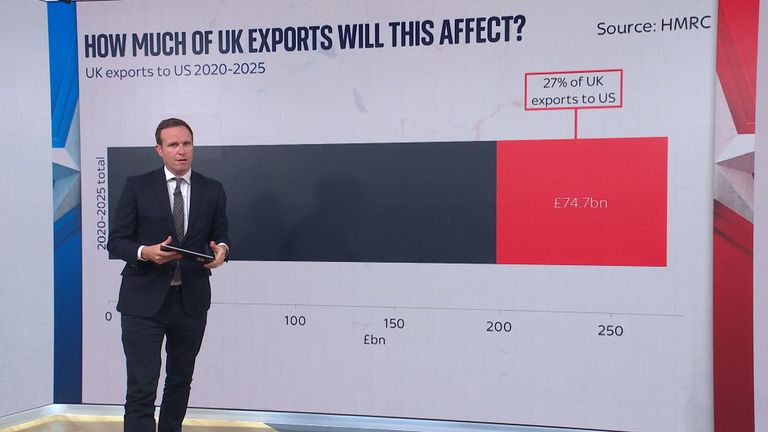Trump hails ‘total reset’ with China as trade tariffs slashed


The US and China have agreed to slash trade tariffs on each other, a move Donald Trump has said was part of a “total reset” in relations.
The president said the 90-day truce followed “very friendly” talks between the two sides in Switzerland over the weekend and those discussions would continue..
“China was being hurt very badly. They were closing up factories they were having a lot of unrest and they were very happy to do something with us”, he told reporters at the White House.
The breakthrough was announced early on Monday – to the delight of fincial markets – by the leader of the US delegation, treasury secretary Scott Bessent.
US trade representative Jamieson Greer confirmed so-called reciprocal tariffs were now at 10% each.
In real terms, it meant the US is reducing its 145% tariff to 30% on Chinese goods. A tariff of 20% had been implemented on China when President Donald Trump took office, over what his administration said was a failure to stop illegal drugs entering the US.
China has agreed to reduce its 125% retaliatory tariffs to 10% on US goods.
Sector-specific tariffs, such as the 25% tax on cars, aluminium and steel, remain in place.
Money blog: Life as a divorce lawyer
Tariffs, taxes on imports of more than 100%, had been imposed on both sides. China was the only country exempt from a 90-day pause on the “retaliatory” tariffs above the base 10% levies applied by America.
Major retailers had been warning Mr Trump of empty shelves as US importers pause shipments.
Mr Bessent said after a weekend of negotiations in Switzerland, the countries had a mechanism for continued talks.
It’s the second major trade announcement made by the US in the last week, after a deal was secured with the UK on Thursday.
The move signals a willingness from the Americans to make deals on tariffs.
Economics and data editor
Of all the fronts in Donald Trump’s trade war, none was as dramatic and economically threatening as the sky-high tariffs he imposed on China.
There are a couple of reasons: first, because China is and was the single biggest importer of goods into the US and, second, because of the sheer height of the tariffs imposed by the White House in recent months.
In short, tariffs of over 100% were tantamount to a total embargo on goods coming from the United States’ main trading partner.
That would have had enormous economic implications, not just for the US but every other country around the world (these are the world’s biggest and second-biggest economies, after all).
So the truce announced on Monday by treasury secretary Scott Bessent is undoubtedly a very big deal indeed.
Welcomed news
The news was received positively by Asian stock markets on Monday as major indexes were up.
In China, the Shanghai Composite stock index rose 0.8%, the Shenzhen Component gained 1.7%, and Hong Kong’s Hang Seng index was up nearly 3%.
In countries across Asia, benchmark stock indexes also rose. Korea’s Kospi grew 1.1%, Japan’s Nikkei was up 0.8%, while India’s Nifty 50 index of most valuable companies gained more than 3%.
US stocks rose sharply at the open.
The S&P 500 and tech-heavy Nasdaq saw their biggest leaps in more than a month, rising almost 3% and 4% respectively.
The market rally was visible in Europe too.
The dollar – hit in recent weeks by US recession speculation – was up more than a cent versus the pound while oil prices also rallied. Brent crude, the international benchmark, was 3.5% higher at $66 a barrel.
What next?
When asked by journalists about what the US wanted to see from China in the 90s, Mr Bessent said, “As long as there is good faith effort, engagement and constructive dialogue, then we will keep moving forward.”
Please use Chrome browser for a more accessible video player

2:02
Explained: The US-UK trade deal
The UK came to the front of the line for deals, Mr Bessent added, “as our oldest ally”.
Switzerland had also moved to the “front of the queue”, he said, while the EU has been slower.
As with the other counties subject to 90-day pauses, a permanent deal will need to be reached, but confidence across the world is likely to have been boosted.

Listen to The World with Richard Engel and Yalda Hakim every Wednesday
Businesses now need a clear timetable and roadmap for future negotiations under the newly announced economic and trade consultation mechanism, said Andrew Wilson, the deputy secretary general of the International Chamber of Commerce.
“The credibility of that process for resolving underlying frictions in the Sino-US economic relationship will be mission-critical in terms of restoring business confidence.”